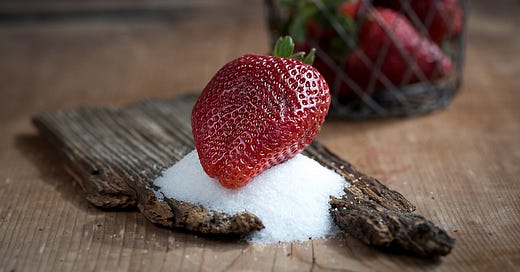If You Love Sugar, Count On Illness!
Some people ask me if they should stop eating sweet produce such as oranges and carrots, because they want to cut back on sugar. I always tell them to consider that not all sugars are created equal. One class of sugars is natural (from whole foods) and the other is unnatural (added by food companies).
SO – don’t limit the natural sugars. Though an orange may contain 12 grams of sugar, it also provides vitamins, minerals, antioxidants and fibre – all which combine synergistically to absorb more slowly than its refined sugars. And natural sugar does not raise the risk of diabetes the way its refined counterpart does, so no health organization recommends limiting the natural variety. Fill up on wholesome foods – vegetables, fruits, dates, figs, etc. They’ll fill that sweet craving and are healthy to boot.
Added sugars should not exceed 10% of total calories (about 40-45 grams daily), according to a report released by the World Health Organization entitled “Diet Nutrition and the Prevention of Chronic Diseases.” However, I recommend that you scale back even further for good health, because even small amounts of unnatural elements in the body add up over time and suppress bodily processes.
The makers of processed foods don’t care though. Every year they add more sugars to their products, up to the point where Statistics Canada says we consume about 23 teaspoons of them daily – based on an average 2000-calorie diet. This doesn’t include all the other added sugars we get from corn sweeteners (liquid candy) – the main ingredient in pop, nor the sugars in fruit juices.
How can you tell if a food contains added sugar? Read the ingredient list! “Free sugars” are all monosaccharides and disaccharides (including refined sugars from cane, beet and corn).Add it all up and by any mathematical standard, some people are eating more than half their body weight in sugars every year. That’s a whole lot of calories, with subsequent obesity and related health problems like diabetes and heart disease.
Look for:
brown sugar
corn sweetener
corn syrup
dextrose
glucose
high fructose corn syrup
invert sugar
malt syrup
molasses
sucrose
table sugar
sugars naturally present in honey, syrups and fruit juices
turbinado
amazake
sorbitol
carob powder
“Food companies have to make food as cheap as possible so that more people will buy it and they do that by putting in corn sweeteners. The more corn sweeteners you have in a food, the cheaper it is on a per calorie basis.” (CBC Marketplace – Sugar Surprise, March 9, 2004).
Additionally, look for added starches in food (which thicken a product cheaply) but also thicken your waistline, being quickly absorbed as energy and acting like sugars in the body.
If you really want to become healthy, don’t worry about reading labels. Yes, you read that right! Start eating wholesome foods which are not manufactured in a can or a box. Start cooking with your own ingredients and stop letting others do the work for you. That way you control what goes into your food and ultimately your own health. If you don’t like what I say because you deem yourself too busy, then count on getting sick and ultimately contracting a disease.
Let’s face it, your health should be more important than a few extra hours at your job. You can’t enjoy the good things in life when lying in bed sick. Trust me on this, I’ve seen it too many times. And though I’m not a betting man, I’ll bet those sick people probably wish their hearing had been a lot better while they were still healthy!





